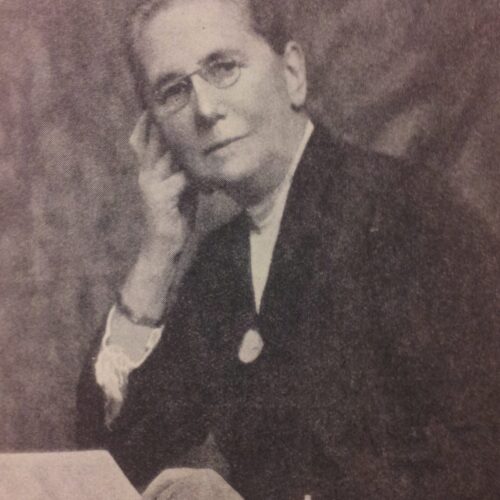

When we are asked to believe that nothing but a supernatural ideal can inspire and sustain a life-time of complete service, free from all thought of self, we need look no further than the career of Hypatia Bradlaugh Bonner.
Advertisement in The Literary Guide for Hypatia Bradlaugh Bonner: The Story of Her Life, published by Watts & Co. (1942)
Hypatia Bradlaugh Bonner was the daughter of pioneering secularist Charles Bradlaugh, but was herself a remarkable humanist, who lectured, wrote, and organised in the name of human rights, rationalism, and peace. A Vice President of both the National Secular Society and the Ethical Union (now Humanists UK), she also sat on the Executive Committees of the Humanitarian League, the International Arbitration League, and the Women’s National Liberal Federation. She campaigned against the death penalty and the blasphemy laws, and staunchly defended the reputation of her father, while creating a worthy legacy of her own.
Honesty, courage, steadfastness, and sympathy: these, I hope, have been the guiding lights of my life.
Hypatia Bradlaugh Bonner, ‘Mrs Bonner’s Last Farewell’, The Literary Guide, October 1935
Hypatia Bradlaugh was born in London on 30 March 1858, the daughter of prominent secularist Charles Bradlaugh and his wife, Susannah (née Hooper). Alongside her elder sister, Alice, Hypatia was educated at private schools, and later at the secular school at Old Street’s Hall of Science. There, Hypatia studied, taught, and met her future husband, Arthur Bonner. The couple became engaged in 1884, and were married the following year.
Both Alice and Hypatia were active in freethought circles: lecturing, writing, and becoming Vice Presidents of the National Secular Society. Hypatia contributed regularly to her father’s National Reformer, and to Annie Besant’s Our Corner. She also acted, until his death in 1891, as secretary to Charles Bradlaugh, after which she devoted herself to writing the two-volume Charles Bradlaugh: a Record of his Life and Work, published in 1894. She worked tirelessly to defend her father’s reputation, and wrote a rebuttal to claims of a deathbed conversion to Christianity entitled Did Charles Bradlaugh Die an Atheist? (1898).

Hypatia Bradlaugh Bonner was the founding Chair of the Rationalist Peace Society, formed in 1910 ‘to carry on Peace propaganda on Rationalist lines’. In 1913, introducing a collection of essays written to present a rationalist perspective on peace, she wrote of the urgency of such a task, rejecting the notion that anti-war work was the preserve of the Christian. The essays, she wrote, were:
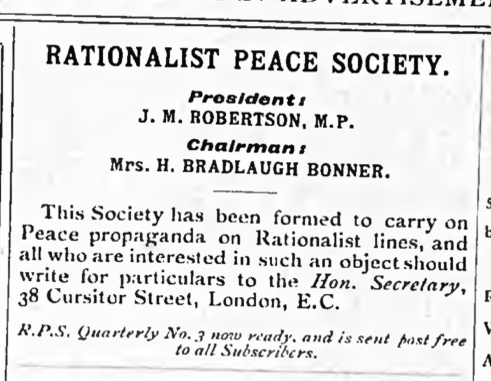
…not merely desirable, but necessary, because until the formation of the Rationalist Peace Society in 1910 the work of Rationalists has been merged in that of existing organizations, which are either run definitely in connection with particular religious bodies, or which associate themselves to a greater or less degree with religious influences. As a consequence, Rationalists have found their work not only annexed without acknowledgment, but actually claimed as peculiarly Christian, and have had to hear it repeated ad nauseam that Christianity is synonymous with Peace, and that none but Christian peoples abhor war.
Hypatia Bradlaugh Bonner, Essays Towards Peace (1913)
As well as noting the pacifist ideals present in non-Christian belief systems, such as Confucianism and Buddhism, Bradlaugh Bonner pointed to a venerable tradition of freethinkers who had criticised or rejected war, including Voltaire, Paine, Shelley, and Comte. In contrast to those ‘Christian rulers’ who had for centuries ‘gone to war in order to assert the superiority of their faith’, she quoted L.T. Hobhouse (President of the Ethical Union in 1923), who had observed in 1899 that:
It would seem that there are few except the despised Rationalists and Agnostics (Atheists the Church would call them) to maintain that the moral law is the same for nations as for individuals, and that there is no higher and deeper policy than to do as we would be done by.
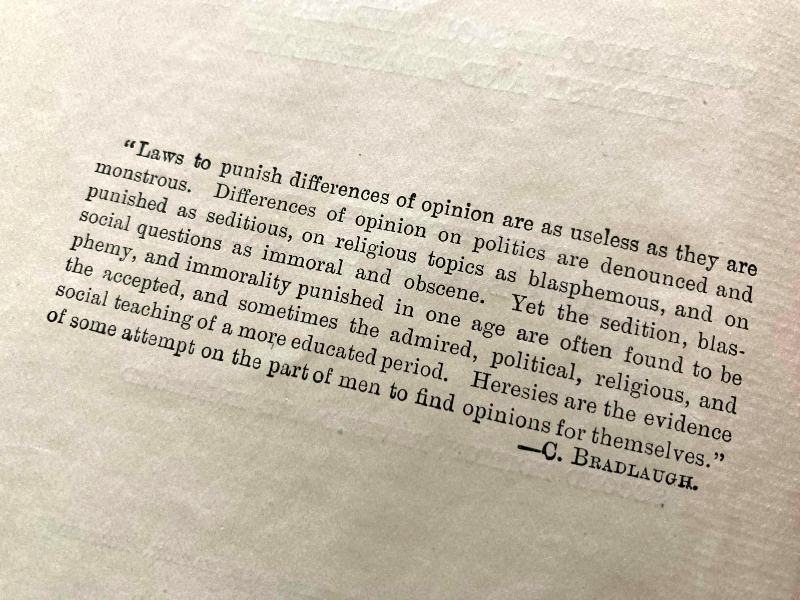
Bradlaugh Bonner’s hope, that ‘the work which our predecessors have done individually and without recognition we to-day… carry forward’, echoed her intentions in publishing Penalties Upon Opinion; or Some Records of the Laws of Heresy and Blasphemy (1913). This, she wrote, was published ‘in the hope that a thoughtful and enlightened public may be induced to demand the reconsideration and repeal of the Blasphemy Laws’. It was, she argued, ‘essential that lovers of liberty… take stock of their position and ascertain just where they stand.’ Like many humanists before and after her, she vigorously championed the repeal of these ‘penalties upon opinion’; laws which would remain in place for nearly another century, before their eventual abolition for England and Wales in 2008.
Throughout the early decades of the 20th century, Hypatia Bradlaugh Bonner lectured, organised, and wrote in the name of progressive political thought and humanist values. She was an advocate of women’s suffrage, an opponent of the death penalty, and a promoter of moral (rather than religious) education in schools. She was actively involved with the Rationalist Press Association, including as a regular contributor to The Literary Guide (now the New Humanist) and the Agnostic Annual, as well as serving on the Executive Committees of the Humanitarian League, the International Arbitration League, and the Women’s National Liberal Federation. She remained a popular speaker for freethought and humanitarian causes until 1924, when an ailing voice necessitated her retirement from the lecture circuit. She served as a Justice of the Peace 1921-1934, which she valued – wrote J.P. Gilmour – for ‘the opportunities it provided to have justice tempered with mercy, and thus helping to avert that wrecking of human lives which arbitrary punishment of first offenders is apt to entail’.
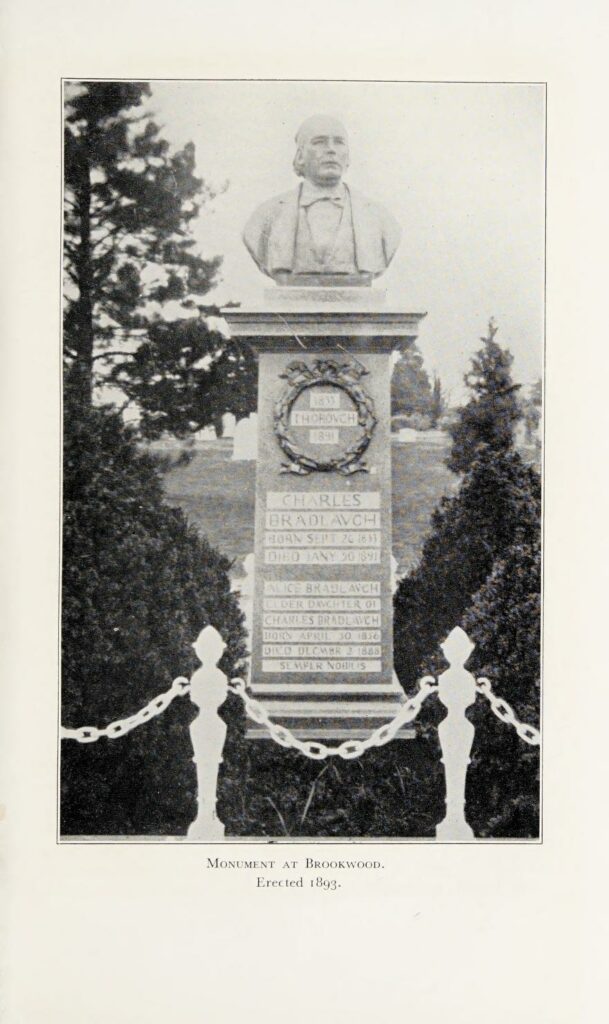
Hypatia Bradlaugh Bonner had suffered with poor health since childhood, but was noted for bearing it with bravery. On 9 May 1935, six days ahead of undergoing a serious operation, she set down her ‘final thoughts’ on religion, preempting accusations of any deathbed conversion. She was, she wrote, ‘sick in body, but sound in mind’. She had never believed in any god or gods, but had always endeavoured to live honestly, bravely, and sympathetically. Her final paragraph read:
Away with all these gods and godlings; they are worse than useless! I take my stand by Truth—by tested truth, which includes sincerity and honesty. I do not mean a truth which changes colour from day to day according to the barometer of an emotional mind. The truth I stand by may be enlarged, or in some degree modified, in the course of years by the increase in our knowledge: but in essentials it remains to-day much as it did for me seventy years ago. Honesty, courage, steadfastness, and sympathy: these, I hope, have been the guiding lights of my life. I have made mistakes— as everyone has— some of which I have been very sorry for; but this I can say with confidence, that I have never wilfully injured anyone, and that I have always endeavoured to see and understand the other point of view.
And so Good Night.
‘Mrs Bonner’s Last Farewell’, The Literary Guide, October 1935
Hypatia Bradlaugh Bonner died at home, 23 Streathbourne Road, London, on 25 August 1935. She was cremated at Golders Green Crematorium three days later, with a service featuring tributes from J.P. Gilmour, Chapman Cohen, and Harry Snell. Her ashes were interred alongside her father at Brookwood Cemetery.
Our emotions are aroused because henceforth we shall not see or hear, or be associated with, one whose life was of abiding personal and social value, and who shared our enthusiasms, disappointments, and duties. But we do not grieve that the life of our friend has run its course. Why should we grieve for a life so worthily lived?… We shall miss her counsel; but we shall be inspired by our memories of her.
Harry Snell, tribute to Hypatia Bradlaugh Bonner, 28 August 1935
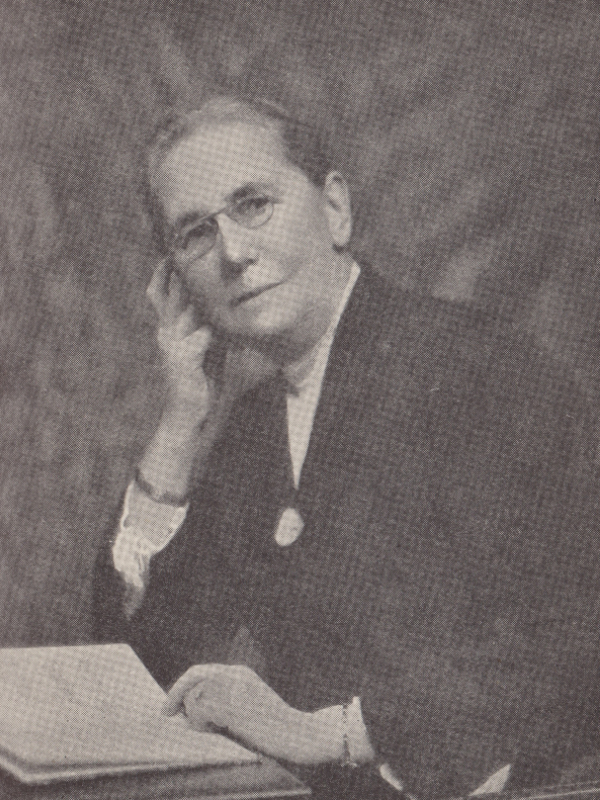
As her obituarist in the Ethical Record noted, Hypatia Bradlaugh Bonner, ‘in her own right and on her own merits’:
earned a name and a place for herself not only in service to the causes with which her father was identified, but also, in many other progressive and ameliorative political and social reform agencies.
Ethical Record, October 1935
Like fellow secularist daughter Emilie Holyoake-Marsh, Hypatia Bradlaugh Bonner carved out a path for herself within the organised humanist movement, championing a wide range of progressive ideas and ideals, and demonstrating a lifelong commitment to reason and to empathy. As each speaker at her funeral service emphasised, she had lived an exemplary humanist life. Chapman Cohen, whose tribute was printed in The Literary Guide some months after her funeral, said:
There is no need to minimize the sorrow of death, but there is folly in exaggerating it. What is required is clarity of mind and strength of character. These were two qualities which Hypatia Bonner possessed in a marked degree. She was trained in a school of philosophy which taught that life and death are woven of the common stuff of which love itself is born, and that the grief which death brings is born of the love that comes with life. To those who mourn we can give but one counsel. Let grief have its way today; and to-morrow let us take a fresh plunge into life and duty, and so prove ourselves worthy of the affection the dead gave us.
Chapman Cohen, Tribute to Hypatia Bradlaugh Bonner, printed in The Literary Guide, November 1935
Rationalist Peace Society and Hypatia Bradlaugh Bonner’s Thomas Paine Collection | Bishopsgate Institute
Hypatia Bradlaugh Bonner by Edward Royle | Oxford Dictionary of National Biography
Essays Towards Peace (1913)
Works by Hypatia Bradlaugh Bonner | The Internet Archive
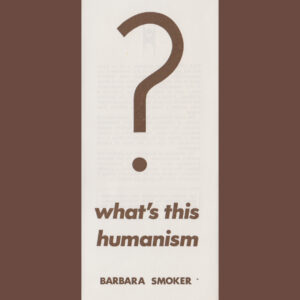
The principles of humanism are positive and exacting commitments. People do not become Humanists merely on rejecting supernatural beliefs. But […]
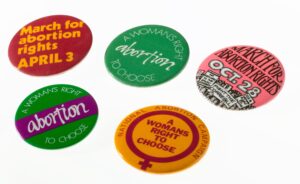
The… women on the early ALRA committee were similar in background and outlook. Most of them were active members of […]
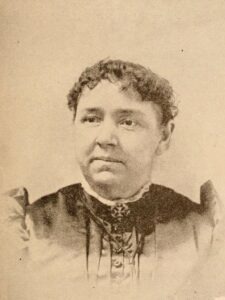
Man for man in larger sense does what heaven fails to do. Sara A. Underwood, quoted by Rufus K. Noyes […]
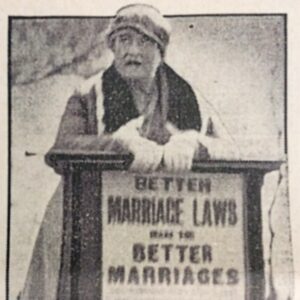
If the basic cause of an unsuccessful marriage is removable, conciliation is the proper procedure. If it is not removable, […]